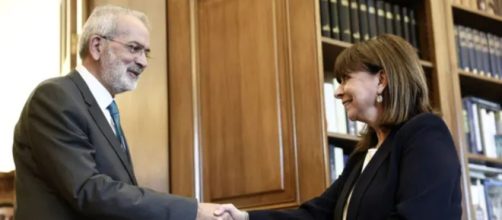Greece recently held an election for members of the Parliament of the Hellenes, the country's legislature. The incumbent party in power did seem to notch a rather decisive result. However, it wasn't quite enough to score an outright majority of seats in the Parliament.
None of the biggest players involved seem keen on entering a coalition. And, barring Constitutional problems, Greece seems headed in the unusual direction of two national elections in as many months. But in the meantime, the government must continue to function.
Judge appointed as caretaker prime minister
Greek President Katerina Sakellaropoulou has named Judge Ioannis Sarmas as the new prime minister on an interim basis. Sakellaropoulou has been president since 2020 and is politically an Independent. Prior to taking on her current role, she had also been one of the country's highest-ranking judges.
Sarmas is likewise evidently and Independent. His new job, however long or short it may last, means at least temporarily leaving the judiciary. But Sarmas was set to be vacating some of the duties in the not too distant future as it stood anyway. He has been the top judge of the Synedrio, one of the Supreme Courts of Greece. Though it may go against the grain, Greece actually has several of them.
In the Synedrio's case, its jurisdiction is based in financial matters. Sarmas has been at the head of the court since 2019. His term in the role would soon be concluded and by law he would have to step aside.
Sarmas is also a member of another of the Supreme Courts, the Supreme Special Court. The Special Court is not permanently in place. It is called into action only under particularly special circumstances, including electoral and Constitutional disputes.
The National Herald indicates that Ioannis Sarmas is a native of Kos. An island in the Aegean Sea near the Turkish border. He would go on to serve in the Hellenic Air Force as an officer. Eventually, he also taught law at the National Centre for Public Administration.
The first Supreme Court that Sarmas would serve as a judge with was the Council of State. Which typically oversees administrative proceedings. Sarmas was also a longtime member of the European Court of Auditors.
Three biggest political groups have said they won't form a coalition
The New Democracy political party finished far and away in first place in the recent election. It promotes a platform of centrist to right-of-center policies and criticism of populism. Going into the election, it was led by Prime Minister Kyriakos Mitsotakis. Mitsotakis remains the leader of the party. Though obviously, at least for now, he cannot continue in the prime ministerial role.
Normally, the distance in results between New Democracy and its rivals would seem like an outright victory.
But four other parties managed to secure just barely enough seats to deny them such a feat. A coalition between New Democracy and any of the other four would easily be enough to reach the mark. But CNN reports that Mitsotakis prefers a second round of voting. Hoping that the second time around would result in his party winning enough seats for the thus far elusive majority.
Even if Mitsotakis was more open to a coalition, at least two of his potential partners apparently are not. Those being former Prime Minister Alexis Tsipras and his Syriza party and PASOK - Movement for Change alliance led by Nikos Androulakis. Until recently, Androulakis had been a member of the European Parliament.
It seems unlikely that either could make up enough ground to surpass New Democracy in a matter of weeks. Although they could hope to increase their share of seats. But then they'd probably have to change their stances on a coalition to flex their potential influence.


